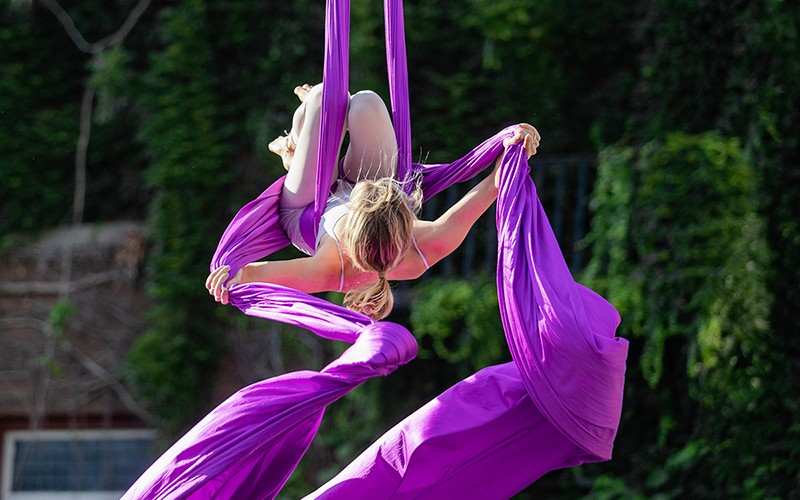
From conducting health policy research in Zambia to interning at Nike to teaching aerial circus classes right here in Ithaca, this summer was one to remember for College of Human Ecology students. We asked eight current undergraduates to share their summer experiences, in their own words: from what surprised them most… to how they navigated unexpected challenges… to the biggest lessons they learned and how this newfound knowledge has made their CHE experience even better now that they’re back on campus.
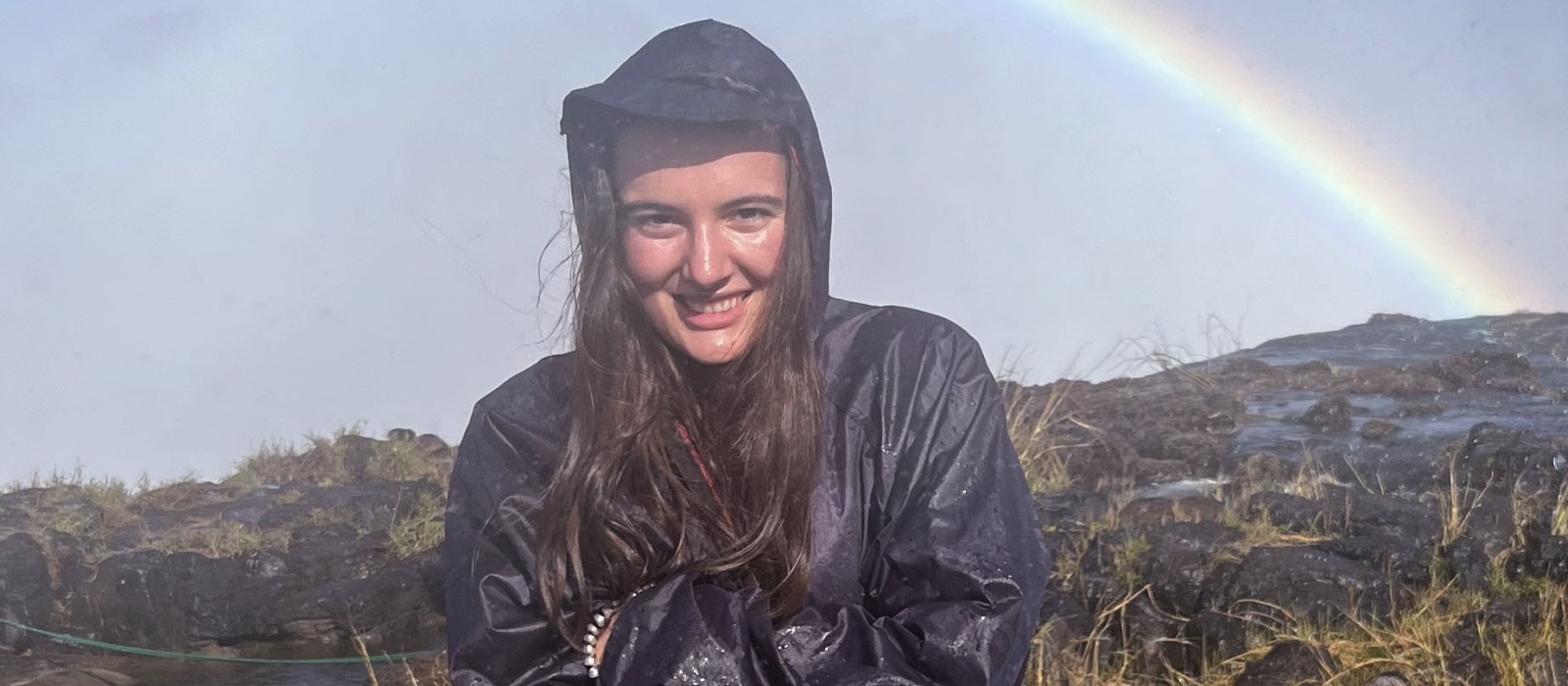
Grace Maines ’24 in Zambia
Grace Maines ’24 – Global and Public Health Sciences
Conducted research in Zambia focused on health equity and policy to curate an Atlas of Legal Needs Survey
“This summer I conducted research on access to justice in the Zambian context with a team at the Southern African Institute for Policy and Research to create a framework and methodology for a legal needs survey – a tool that measures the challenges a specific population faces in accessing justice. This atlas shows some of the important information that such a survey reveals. Zambia is the only country in the region without one, thus there was a demonstrated need for this work.
For my summer experience, I was challenged to dive into a topic that I found extremely interesting yet quite novel. This pushed me out of my comfort zone as I learned how to navigate a new environment both literally, being in a new country, and professionally, as I explored the law and policy side of global health. I grew my confidence in new areas of study and realized things about myself such as a strong interest in access to justice work and human rights policy. Above all, the most valuable skill that I cultivated this summer was cross-cultural communication. This fall semester, I anticipate using this skill to better connect with my peers and integrate empathy into my professional conversations.”
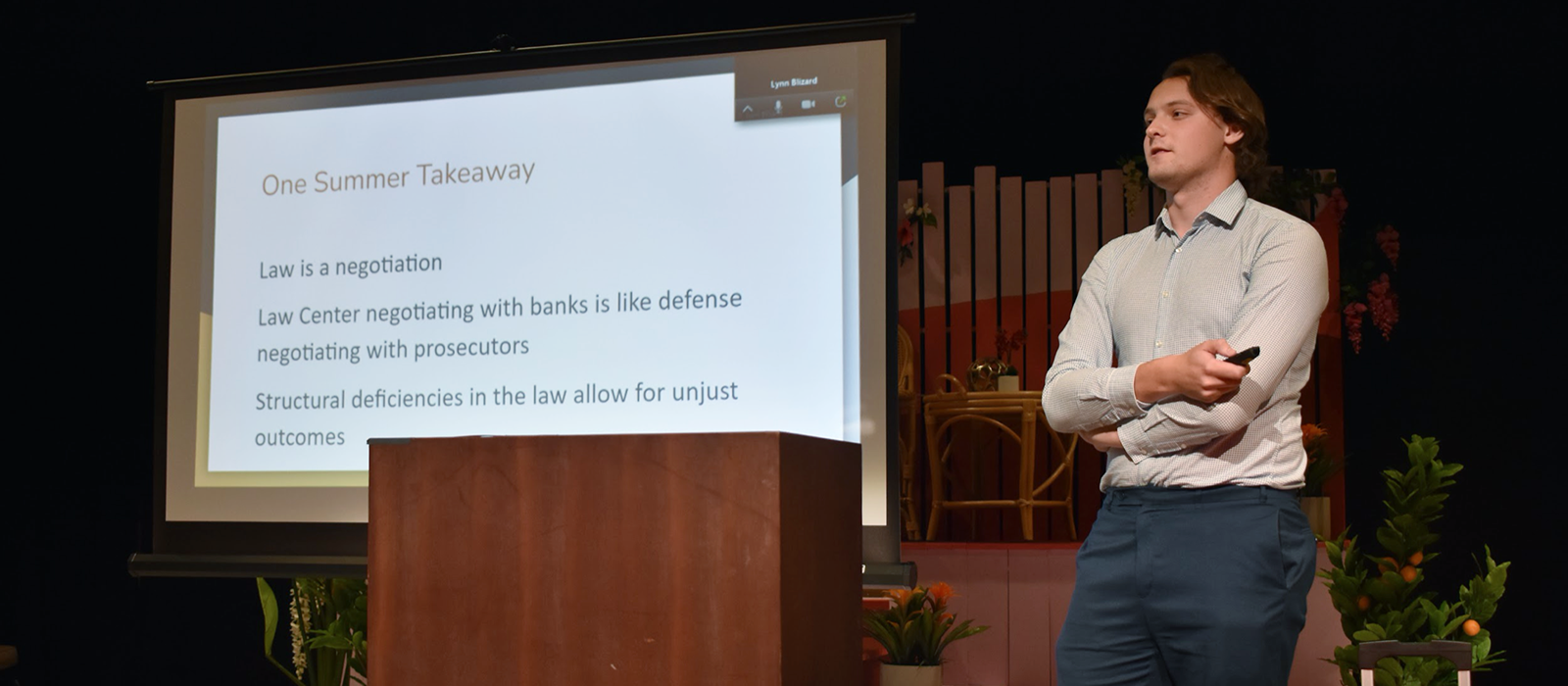
Noah Berg ’24 presenting on his summer project
Noah Berg ’24 – Human Development
Interned at a regional nonprofit Law Center in Buffalo, analyzing costs, benefits of property law enforcement
“I spent the summer writing a funding request for a nonprofit Law Center in Buffalo so they can continue to address vacant properties. Vacant properties are disproportionately likely to be on the East Side of Buffalo, which is a mostly low-income, majority African-American, highly segregated neighborhood that has been harmed by generations of deliberate disinvestment. Having a chance to report on the vacant property issue will hopefully lead to more people understanding how it is an inequality issue.
Through writing a 30-page funding request that will be submitted to a County legislature, I had an amazing opportunity to practice writing that is both persuasive and formal. Human Ecology helped me develop the tools to write this report in the first place. My classes and research have taught me how to write literature reviews, and I used these skills to clearly lay out the scientific research about the harmful effects of vacant properties."
Claire Nguyen ’25 – Human Biology, Health and Society
Worked full-time as an ophthalmic technical assistant and conducted independent research for Orange County Retina
“This summer, I worked as an ophthalmic assistant for Orange County Retina, a large, private medical group in Newport Beach, California, specializing in treating and researching diseases of macula, vitreous, and retina. On the clinical side of the practice, I helped numb patients' eyes in preparation for procedures such as intravitreal injections, laser treatments, and cryotherapy. Additionally, I assisted the doctors during these procedures and provided patients with post-procedure care. Lastly, I completed and signed off on charts and wrote prescriptions for ophthalmic medications for the doctors. On the research side of the practice, I started writing a co-authored clinical case report on a unique case for publication. I also conducted an independent research project on a different unique case and presented the case at a conference to over 150+ optometrists around Orange County.
One of the doctors I worked with constantly asked me questions that I hadn't learned the answers to yet. He would often begin the questions with, "Most second year residents don't know this, but..." At first, these questions made me uncomfortable. I hated not being able to respond. However, over time, I began giving my best guess, and sometimes, I was even right! I know that when I return to the College of Human Ecology, I will bring this quality with me, continuing to be comfortable with questions I don't yet know the answer to.”
Karen Mendoza ’25 – Design + Environmental Analysis
Supported high school students as a program assistant for Cornell’s Precollege Program
“My role as a program assistant required me to plan events for Pre-College students. For many high school students, this Pre-College program is their first exposure to college life. I worked to support them by designing social, cultural and academic experiences that would complement their coursework at Cornell. Towards the end of the Pre-College program, we hosted a staff banquet to celebrate the work we did. During the event, my supervisor spoke about me and my colleagues to the audience, mentioning specific actions that shaped his impression of us. This emphasized for me that small actions can deeply impact how you make those around you feel.
As one of my first professional experiences, the program assistant role came with making mistakes, and I became comfortable with identifying ego and taking accountability. This allowed me to recognize areas for improvement in my academic, professional and personal goals. I see this as a critical skill to hold in human ecology studies, because we are always confronted with tasks with real world applications.”
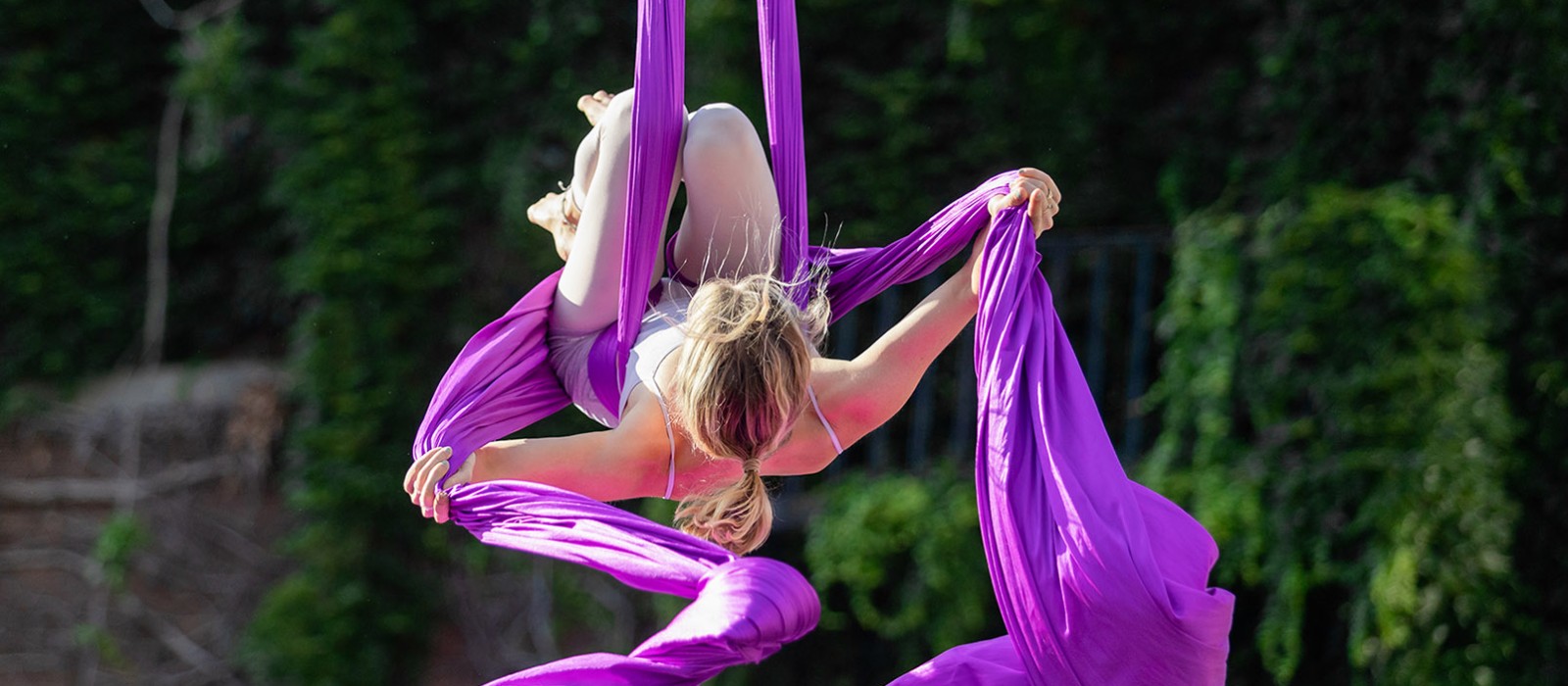
Ainsley Fleming-Wood ’23 performing acrobatics in Ithaca Children's Garden
Ainsley Fleming-Wood ’23 – Nutritional Sciences
Coached aerial circus classes at the Ithaca Children’s Garden as part of a research project on mental health and nature
“Working with Dr. Don Rakow in the School of Integrative Plant Science at Cornell, I received a Human Ecology Alumni Association (HEAA) grant this summer to research the impact of novel play forms on confidence, teamwork and stress levels for teens. For seven weeks this summer, I coached one-hour aerial circus classes at the Ithaca Children's Garden. I trained the counselors-in-training (CITs) to assist me with setting up the aerial rig and equipment, and I taught them aerial silks, lyra, and hammock three times a week. Before the program, I surveyed the CITs to better understand their level of self-efficacy, relationship with nature, experience with playful activities and overall mood. At the end of the session, I surveyed the participants once more about their takeaways from the experience learning circus arts in the garden. Using the survey responses as well as feedback from the CITs, I measured the impact of novel play in nature on mental wellbeing.
I have been a circus artist and performer since I was 11 years old, and the circus has been a source of play, creativity, physical movement, and community in my life ever since. Dr. Rakow has inspired me to research the correlation between happiness and time spent in pursuit of nature. In this project, I wanted to answer the question: How can time playing in nature inspire confidence and teamwork for teens in Ithaca? In my project, I aspired to creatively combine play and nature to improve human health in an equitable manner. I created circus curricula that make all teens feel inspired and accepted regardless of their physical strength and ability. My goal was to create access to new forms of play in the outdoors that would encourage teamwork, laughter, creativity and trust. I hope to continue expanding the impact of circus arts to more of the Cornell community.”
Ishan Shah ’24 – Human Biology, Health and Society
Shadowed a psychiatrist in Houston, conducted remote research for mental health resource organization, continued research in a developmental biology lab at Cornell, volunteered at local HIV/AIDS clinic, prepared for MCAT
“The psychiatrist I shadowed has been a great positive influence in my journey to medicine. One thing I will never forget from this experience is how he changed his schedule while I was there, so I had more time to speak directly with the patients about their conditions and medicines, if they felt comfortable. With this, I truly realized the importance of creating a good bond with your patients, especially in psychiatry.
I also did not anticipate becoming involved with the mental health organization that I did remote research with this summer and plan to continue working with. We are working to provide mental health resources and referrals to an area with a large immigrant and minority population and a large Latinx community. I have had amazing learning opportunities writing a grant proposal and doing a literary review with my colleagues to understand the challenges faced by these groups to obtain proper mental health care, but also to present the need for an effort like this in this area. As an aspiring physician, it is important to understand the challenges faced by different groups of people and how those might affect their conditions."
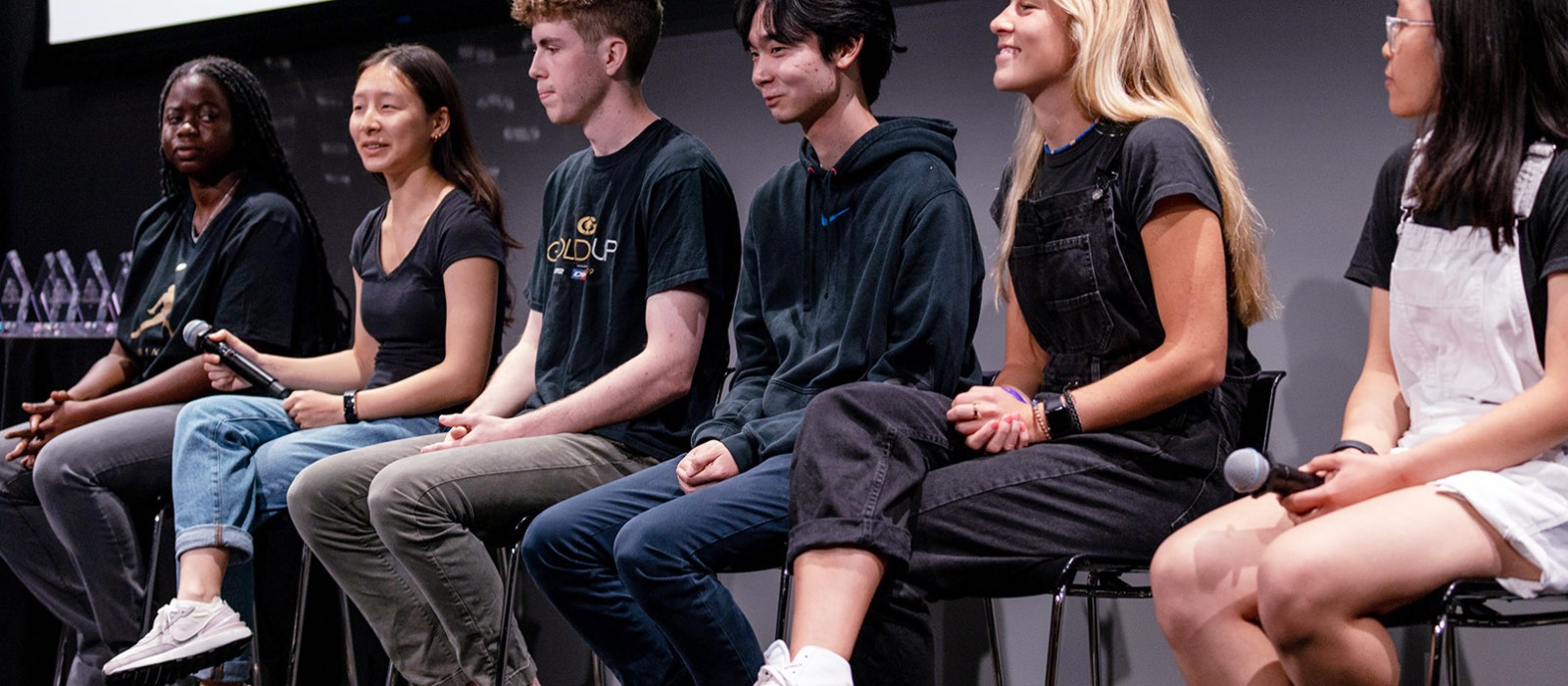
Emily Hsiung ’23 (second from left) presenting on a panel at Nike Headquarters
Emmy Hsiung ’23 – Fiber Science
Worked on kids’ apparel design and development as a global apparel materials intern at Nike
“I worked in global apparel and materials on the kids' textiles team at Nike, which develops trims, textiles and prints. A large part of my internship focused on creating a toolkit to help streamline the material development process. The team works to bring the best textiles to kids' apparel and incorporate new innovations.
I was able to apply some of my knowledge from previous coursework, such as FSAD 4360: Fiber Chemistry and FSAD 3200: Global Textile and Apparel Sustainability, which have taught me so much about sustainable materials.
The most valuable skill I learned was how to adapt to an unexpected situation. I had a lot of obstacles in my project that we didn't anticipate, but I was able to work around them and stay the course, presenting a final deliverable that my team was happy with and I was proud of.”
Gabrielle Finora ’24 – Nutritional Sciences
Worked remotely for both a virtual nutrition coaching company and a nutritional department at a local Cornell Cooperative Extension office
“Over the summer I learned several valuable lessons about running nutrition-based businesses, including how they have had to adjust their models in response to the Covid-19 pandemic. Working remotely for the Wellpower Method team, a completely virtual nutrition coaching company, I was able to experience firsthand the direction many health industries are now taking. A large part of my role involved overseeing the head dietitian’s social media platforms. I learned how moving to a completely virtual platform not only kept Wellpower Method’s patients safe from exposure to Covid-19, but the head dietitian was able to find new opportunities as she was no longer limited to a geographic location to search for business partners or new clients.
Similarly, working at the Cornell Cooperative Extension office allowed me to contribute remotely as well. I was more familiar with their style of remote work, as this was my second year volunteering there. It was interesting to see how virtual nutrition education has changed over the course of the pandemic. I strengthened both my research and communication skills and created a variety of learning materials for both youth and adult-age groups. I also enjoyed writing monthly senior newsletters, with topics ranging from food safety to how to grocery shop on a fixed income.”